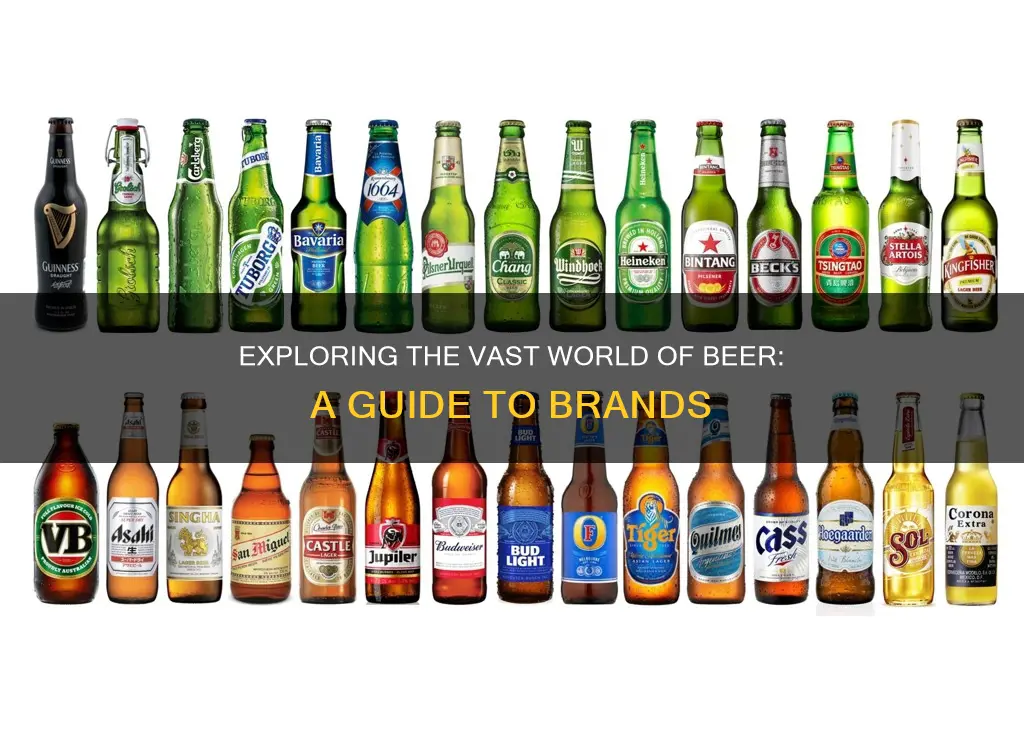
Beer is one of the most popular beverages in the world, and it's been around for a long time. In fact, it's possibly one of the oldest alcoholic drinks known to humanity, with some claiming that the oldest known handwritten recipe is for making beer. With such a long history, it's no surprise that there are a lot of different beer brands out there. While it's impossible to pinpoint the exact number, estimates suggest there could be around 20,000 brands of beer globally, produced by more than 19,000 brewing companies across 208 countries.
What You'll Learn

Craft beer sales are growing
There are over 19,000 brewing companies worldwide, across 208 countries. Of these, an estimated 94% can be defined as craft brewing companies. While the big brewers continue to dominate the market, craft beer sales are growing.
According to the IWSR Drinks Market Analysis report, craft beer sales were up 4.7% in 2018 compared to 2017. In contrast, the market for big commercial brands declined by 1.5% over the same period. This growth in craft beer sales can be attributed to several factors, including the increasing popularity of craft beer among consumers, especially the younger generation. Millennials, in particular, seem to prefer craft beer to regular beer because of its rich and vibrant taste.
Another factor contributing to the growth of craft beer sales is the demand for variety and flavour. Craft beers offer a wide range of unique and artisanal flavours that appeal to consumers looking for something different from the usual mass-produced beers. The growth of microbreweries and brewpubs has also played a significant role in the increasing sales of craft beer. These small, independent breweries drive innovation in taste and provide an authentic, personalized beer experience to their customers.
Additionally, the rise in health-conscious consumers has led to an increased demand for low-alcoholic and non-alcoholic beverages. Craft brewers have responded to this demand by creating beers with reduced alcohol content while still offering a variety of flavours. This shift towards healthier options has further contributed to the growth of craft beer sales.
Despite the challenges posed by inflation and supply chain constraints, the craft beer market is expected to continue growing. According to a report by Mordor Intelligence, the craft beer market size is estimated at 6.52 billion liters in 2024 and is projected to reach 10.03 billion liters by 2029, representing a compound annual growth rate (CAGR) of 9% during the forecast period.
Stout vs Porter: Unveiling Beer's Dark Secrets
You may want to see also

The biggest beer brands in America
There are over 19,000 brewing companies worldwide, across 208 countries. The top four beer makers, Anheuser-Busch InBev, Heineken, Carlsberg, and China Resources Enterprise, control half of the global beer market.
Anheuser-Busch InBev (AB InBev) is the largest brewing company in the world, controlling over 400 beer brands. In the US, it owns some of the country's best-selling beers, including Budweiser (Bud), Bud Light, Busch, Busch Light, Natural Light, and Michelob Ultra. In 2018, Bud Light was America's favourite beer, with 29,350,000 barrels shipped.
MillerCoors is another of America's biggest beer brands, with Miller Lite being the second most popular beer in the US in 2018, and Coors Banquet also in the top 20.
Constellation Brands, Inc. is a New York-based company with a market cap of $42.6 billion. It owns the Boston Beer Company, which makes Samuel Adams and Dogfish Head. Samuel Adams is regarded as one of the most important craft beers of all time.
Heineken is one of the biggest beer companies operating in the US, and one of the most recognisable and widely distributed beer brands globally. It owns popular Mexican beer, Corona, which was America's number one imported beer in 2018.
Other big beer brands in the US include Diageo, which owns Guinness, and Molson Coors, which owns Blue Moon.
Exploring Diverse Beer Markets: A Global Perspective
You may want to see also

Beer brands worldwide
Beer is the most popular alcoholic drink worldwide and one of the most highly consumed beverages overall. The largest beer company in the world is Anheuser-Busch InBev, which recorded a revenue of $57.786 billion in 2022. The company owns 500 different beer brands, including Budweiser, Bud Light, Stella Artois, and Corona. In 2022, Anheuser-Busch InBev produced around 518 million hectoliters of beer, more than double that of the second-largest producer, Heineken.
Heineken is the second-largest beer company in the world and the largest in Europe. The company operates over 160 breweries in more than 70 countries, selling over 8.5 million barrels of beer in the United States alone. Heineken owns popular international brands such as Desperados, Affligem, and Tecate, as well as many regional and local ciders and specialty beers.
The third-largest beer company in the world is Asahi, headquartered in Japan. Asahi's success is largely due to the launch of "Asahi Super Dry," Japan's first dry draft beer. The company also sells a diverse range of alcoholic and non-alcoholic beverages and has been expanding its presence in Europe and the United States.
Other notable large beer companies include Kirin Brewery Co., the second-largest brewery in Japan and a significant player in the global market; Molson Coors Brewing Company, the second-largest beer company in the United States and a competitor in Canada and Europe; and Carlsberg, a Danish company operating over 140 beer brands worldwide.
While these large conglomerates dominate the market, there are over 19,000 beer companies worldwide, with the majority being small microbreweries that are highly localized to their geographic regions.
Pilsner vs Lager Beer: What's the Difference?
You may want to see also

Beer brands by country
Beer is the world's most widely consumed alcoholic drink and is available in a plethora of varieties and brands. Here is a list of popular beer brands by country:
Argentina
Cerveza Quilmes is the top choice for Argentinians. The brand offers lagers, reds, stouts, and bocks.
Australia
Australians enjoy a mid-strength lager called "XXXX Gold," produced by Victoria Bitter. Another popular beer brand in the country is Fosters.
Belgium
The famous Chimay beer of Belgium is made by Trappist monks. Jupiler, a relatively younger brewery, is also popular in Belgium.
Bosnia and Herzegovina
Snow Beer and Tsingtao are two popular beer brands in Bosnia and Herzegovina.
Brazil
Skol, produced by the biggest beer company in the world, AB InBev, holds a large market share in Brazil. Other popular brands include Brahma and Antarctica.
Cambodia
Angkor Beer, named after the country's majestic temple complex, Angkor Wat, is the largest and most famous beer in Cambodia.
Canada
Labatt and Molson are two popular Canadian beer brands. Labatt narrowly beats Molson as Canada's most famous beer.
China
Snow Beer is the largest-selling beer in China, and the world, thanks to the country's enormous population. Tsingtao is another popular Chinese beer brand.
Czech Republic
Pilsner Urquell, the first Pilsner in the world, invented in 1842, is a favourite among the Czechs.
Denmark
Carlsberg is a well-known Danish beer brand and is the best-selling beer in both Russia and Denmark. Mikkeller is another popular brand in Denmark.
Ethiopia
St. George Lager has been the drink of choice in Ethiopia since 1922. It is perfect for cooling down in the hot climate of Addis Ababa.
India
Kingfisher is the reigning monarch of the Indian beer industry, with a market share of more than 50%.
Indonesia
Bintang Beer, brewed locally in Surabaya, is the most popular beer in this South-Asian archipelago. It is owned by Heineken and resembles Heineken in both taste and appearance.
Israel
There is a debate among Israelites about whether Goldstar or its competitor Maccabee is the best-selling beer. However, since both beers come from the same brewery, it ultimately doesn't matter which one wins.
Italy
Peroni, a pale lager from Peroni Brewery, is what Italians like to unwind with after a long day, often paired with their world-famous food.
Jamaica
Red Stripe, famous for its stout little bottles, is Jamaica's favourite brew.
Japan
Asahi, Kirin, Suntory, and Sapporo are the four most popular beer brands in Japan. Asahi has recently gained a slight edge over the others.
Kenya
Tusker is Kenya's largest-selling beer. The name has an interesting backstory, as it was named after an incident where the owner of the brewery was unfortunately killed in an elephant hunt.
Madagascar
Known for its wildlife, Madagascar's favourite national beer is named after animals—Three Horses Beer, or THB. This brewery produces a variety of styles, with the most famous being the pilsner.
Mexico
Corona, Dos Equis, Modelo, and Tecate are some of the popular beer brands in Mexico.
Netherlands
Heineken, the third-largest beer manufacturer in the world, is the largest-selling beer in the Netherlands and is sold in a distinct green bottle.
New Zealand
Tuatara is a popular beer brand in New Zealand.
Pakistan
Murree Beer is the only legally allowed beer in Pakistan, so it is no surprise that it is the largest-selling beer in the country.
Russia
While Russians are known for their love of vodka, they do enjoy the occasional beer, with Baltika being their beer of choice.
Scotland
Tennent's Lager is the go-to beer for Scots when they want to switch from their usual wines and whiskeys.
Singapore
Tiger Beer, founded in 1932, is the popular brew of this island nation and can now be found in over 60 countries worldwide.
South Africa
Castle Lager, a locally brewed lager, is the largest-selling beer in South Africa, despite the country importing a large number of international beers.
South Korea
Hite is the preferred beer in South Korea, although South Koreans generally prefer soju over beer.
Thailand
Singha, named after a mythological creature resembling a lion, is the famous beer in Thailand. Chang is another popular brand.
Venezuela
Cerveza Polar, produced initially in the 1940s, is a well-known Venezuelan beer, pairing well with the famous Venezuelan arepas.
EBC Beer Shipping: State-by-State Availability and Restrictions
You may want to see also

The history of beer brands
Beer has been a part of human history for thousands of years. Historians speculate that prehistoric nomads may have made beer from grain and water before learning to make bread. Ancient civilisations such as the Babylonians, Egyptians, and Chinese all produced beer, and it was so valued that it was sometimes used to pay workers as part of their daily wages.
In the US, the story of beer production was largely set in New York City until the turn of the 20th century. The first commercial brewery in the country was built in New York by the Dutch West India Company in 1632. However, brewing was also common in the homes of many early settlers, including several of America's founding fathers such as George Washington and Thomas Jefferson.
In the mid-19th century, German immigrant brewers introduced cold maturation lagers to the US, with companies like Anheuser-Busch, Miller, Coors, and Pabst all starting up during this time. The modern era of brewing in the US began in the late 19th century with the introduction of commercial refrigeration, automatic bottling, pasteurisation, and railroad distribution.
The temperance movement and the institution of Prohibition in the early 20th century effectively killed off many breweries, and by the 1970s, consolidation and dominance by the country's major brewers led to the fewest number of breweries in the country's modern history. However, this period also saw the beginnings of the country's current craft beer movement, with the first microbrewery since Prohibition, New Albion Brewing, opening in California in 1976.
Stout vs Beer: What's the Difference?
You may want to see also
Frequently asked questions
It is impossible to have an exact number, but estimates suggest there are around 20,000 different beer brands worldwide.
The US and China are home to some of the world's largest brewing companies. However, the Czech Republic has the thirstiest consumers, with citizens drinking 137.38 litres of beer per capita in 2017.
Anheuser-Busch InBev, Heineken, Carlsberg, and China Resources Enterprise are the top four beer makers, controlling half of the global beer market.
Popular beer brands include Budweiser, Corona, Miller, Coors, and Pabst Blue Ribbon.







